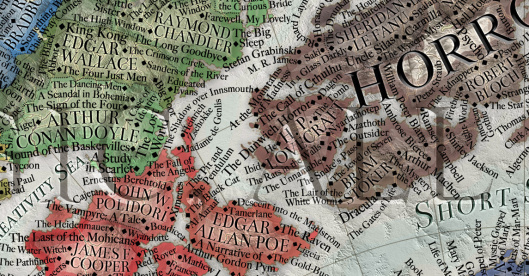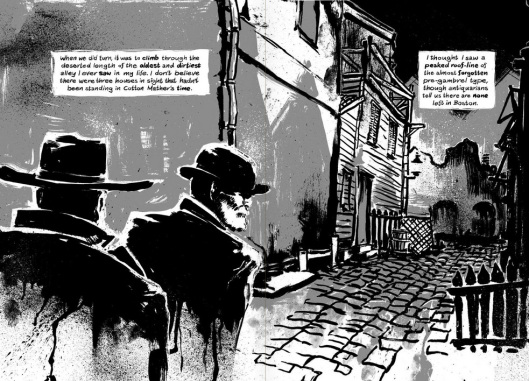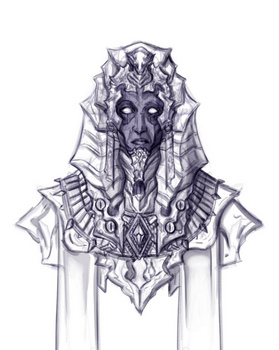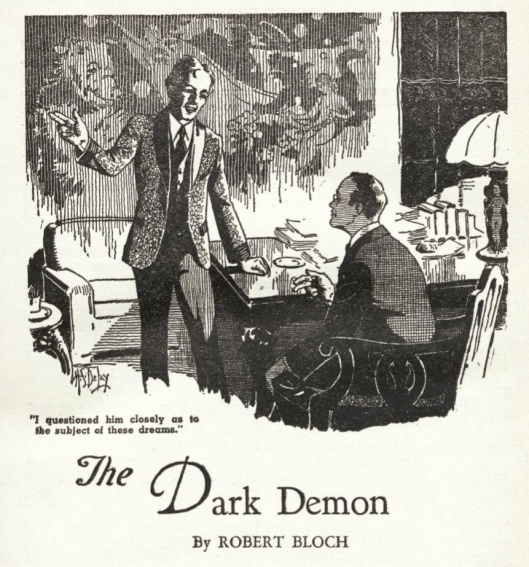Lovecraft’s well-used dictionary was a red-bound one-volume edition of Stormonth or Stormonth’s Dictionary of the English Language (Harpers, New York, 1885 revised). Given its status as one of the most famous dictionaries, it’s regrettable that Lovecraft’s edition is only to be found scanned and online at Hathi — regrettable because Hathi is now so slow as to be effectively unusable, and because they don’t allow whole volumes to be downloaded. The best that Archive.org can offer is an 1874 British edition via the University of Oxford.

Spine of the $6 Harpers edition of 1885, as sold recently at auction.
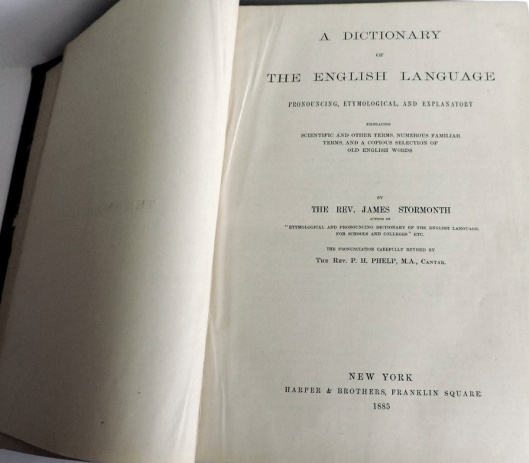
Lovecraft used the Rev. James Stormonth’s venerable dictionary to help him write early letters to Moe on the permissible rhyming of rrr words, circa 1914-1916. It appears that, at that point in time, he had been using the single-volume work since he had first needed a good dictionary. It was one of two dictionaries he asked his aunts to send to New York, when he married Sonia, the other being Webster’s Unabridged (Webster’s International, 1890). Evidently it was not bagged by burgling youths in Red Hook, and if they saw it then they likely baulked at its hefty 1,200+ pages and well-thumbed state. A later letter shows Lovecraft was still consulting and recommending Stormonth in 1929. As late as December 1936 he tells Fritz Leiber that the use of the word constrictious in Adept’s Gambit is doubtful because…
I can’t find it in either of the two dictionaries — a Stormonth & an 1890 Webster’s International — which I possess.
He remarks to Moe that he valued Stormonth because it was thoroughly British and his British father had used the same edition, partly to prevent him “becoming nasally Yankeeised” in America. Lovecraft also valued it because its “conservative authority” eschewed what Lovecraft called “Oxfordisms” (slangy ‘tricks of phrase, syntax, and metaphor’, emanating from the University of Oxford) and gave the proper London pronunciation of the mid Victorian period. The first edition was in 1871, so the well-bred speech of the 1860s might be assumed…
Amidst the sea of conflicting usage, the man of sense will pronounce as his father and grandfather pronounced before him. I use a Stormonth’s Dictionary which was my father’s — recommended to him by his father. And I shall use it till I die, Sir! A fig for your momentary fashions!
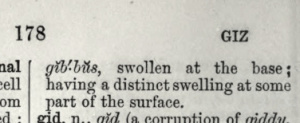
He was largely averse to the Victorians, especially their mawkish Dickensian sentiment and their larger forms of architecture. Yet admired the era’s spirit of idealism, and also its personal manners and refined pronunciation. In 1927 he wrote…
If I could create an ideal world, it would be an England with the fire of the Elizabethans, the correct taste of the Georgians, and the refinement and pure ideals of the Victorians.
Given his vast collection of old books, it seems a little curious to me that Lovecraft only ever had two dictionaries, even if they were thick enough to stun a rat and thus presumably very comprehensive. The Rev. Stormonth wrote several other useful dictionaries which Lovecraft might have used and enjoyed. For instance, one wonders if Lovecraft knew of his A manual of scientific terms, pronouncing, etymological, and explanatory, chiefly comprising terms in botany, natural history, anatomy, medicine, and veterinary science, with an appendix of specific names (1885), which appears to be a shelf-companion for the scientific reader to Stormonth’s Dictionary edition of the same year. This is now on Archive.org and one can see from the first few pages that it is not an ordinary dictionary, as the startled dipper encounters curiosities such as abrachia (‘absence of the arms’), acanthocephala (‘parasitic worms armed with spines’), achroma (deficiency in colour), actea (‘the elder tree, full of clusters, clustering … black snake root’), aduncate (‘bent in the form of a hook’), amadou (from the German, ‘dry leathery fungus found on old trees’). Even in the first few pages there are inspirations for weird horror stories a-plenty. But perhaps he didn’t need the additional volume, because its 300 pages were already included in the much larger 1885 edition? Until we get a workable online copy of the larger work, we can’t know.
Stormonth’s dictionaries included ‘phonetic pronunciation’, meaning that the word is also given in a special phonetic alphabet meant to indicate ‘how you say it’. You can see an example above, drawn from A manual of scientific terms. Lovecraft appears to have been as conversant with the ‘phonetic pronunciation’ system as he was with poetic meter. But this system is not easily graspable by the tongue of the layman. Is there a simpler method to ‘hear’ the form, involving computers? Of course, you won’t find the ‘phonetic symbols’ on a standard keyboard. But what about a virtual keyboard? Yes, there’s one of those at ipa.typeit.org, so you can at least painstakingly get the complete ‘word’ from the page of a book to your Windows clipboard. But how then to have the computer ‘speak’ it? The indications are that such things are still in the realm of academic papers, surprisingly, but there is one basic option — for free at the 2017 tech-demo phoneme synthesis. Which, apart from the mechanical robo-voice in which the words are spoken, is a cool demo because it’s happening in your browser in javascript. As the maker of the site states, “It was odd that this tool did not exist”. I concur. Who, looking at a dictionary like Stormonth, would not want a digital version of it to embed one-click ‘click to pronounce’ speech-to-audio synthesis?
But possibly a more portable solution might be best — a free browser add-on that knows how to OCR (copy) the notation symbols from the screen, then offers options for correcting the inevitable copying errors from small complex text, and then knows how to pronounce the resulting ‘word’ using your chosen TTS audio voice. There is a browser tool that does this for the phonetic instances given on Wikipedia entries, but in that case they’re already neatly typed out. Such an addon might be extended to OCR not only the International Phonetic Alphabet (est. 1888), but also pre-1888 phonetic systems, and allow a choice of speaking voice. In which case, someone should please synthesise Terry Thomas, so that we can get an authentic sounding male British voice for the Victorian dictionaries.
Or erm… (oh, it’s Kittee Tuesday!) just for fun you could have it read by a cat. Now there’s an idea, a TTS voice that can read any text in a voice that sounds sort-of like it should be a cat ‘speaking’. Just add small purr-lings, and micro-meows, and some touches of LOLcat-ese…









